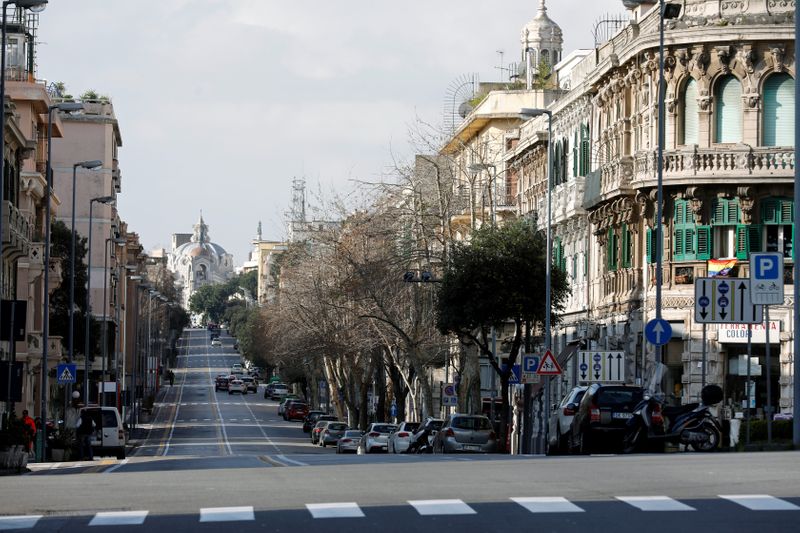By Giuseppe Fonte
ROME (Reuters) - Italy on Monday adopted an emergency decree worth 25 billion euros ($28 billion) to support an already weak economy battered by the worst outbreak of coronavirus in Europe.
Italy recorded 368 deaths from COVID-19 on Sunday alone, easily the biggest daily toll recorded in any country so far, and its hospitals are struggling to cope with the flow of new cases.
The decree is aimed at softening the blow to an economy virtually brought to a halt by draconian measures put in place last week to try to stem the contagion.
Schools, shops, restaurants and sporting events have been closed or canceled, and Italians have been told to stay at home unless they have essential needs.
Among a raft of measures, the decree suspends loan and mortgage repayments for companies and families thanks to state guarantees for banks, and increases funds to help firms pay workers temporarily laid off due to the lockdown.
"This is a weighty economic package. We never thought we could face this flood with mops and buckets," Prime Minister Giuseppe Conte told a news conference attended by just four reporters due to the government's restrictions on gatherings.
"We can speak about an Italian model not only due to our strategy to curb contagion, but we can also start to talk about it regarding our political and economic strategy to tackle this great political and social emergency."
He added that the government was aware that the package, which he dubbed the "heal Italy" decree, was not enough to deal with the crisis and it was already working on new measures.
Economy Minister Roberto Gualtieri said the new measures would be approved next month.
Monday's decree is immediately effective and provides 3.5 billion euros ($3.9 billion) to help the hard-pressed health service and 10 billion to support families and workers, ministers said.
It extends parental leave, offers funds to families to pay for babysitters, and suspends all firing procedures begun after Feb. 23.
Gualtieri has said several times that "nobody must lose their job because of coronavirus."
The money spent on the economic stimulus is seen pushing Italy's budget deficit this year well above the European Union's limit of 3% of gross domestic product, compared with the 2.2% it had penciled in last autumn.
Italy's economy was struggling even before the coronavirus hit, posting a quarterly contraction of 0.3% in the last three months of 2019.
Economists forecast much steeper falls in gross domestic product in the first and second quarters of this year, and say the economy will shrink in 2020 as a whole.
Conte praised Italians' response to the nationwide lockdown and thanked all those still at work providing essential services.
"We can all be truly proud to be Italians, and together we will get through this," he said.
